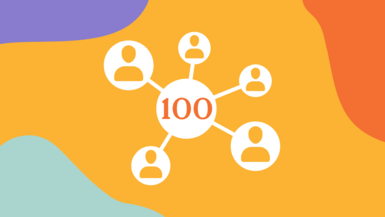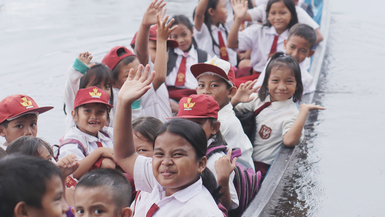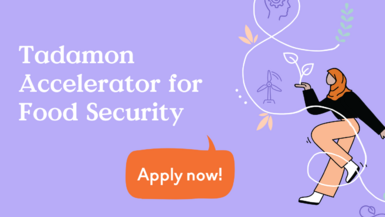
Ramadan is the month of giving –– it is why the holy month generates a surge in charitable giving every year around the world as an act of caring for others.
During our fourth Tadamon Talks, our webinar series following the trends in alternative finance, we brought together a variety of speakers: Samina Akram, Managing Partner, Samak Ethical Finance, Elhadi Elnahoui, Senior Islamic Finance Specialist at IsDB, Greget Kalla Buana, Islamic Finance Specialist at UNDP Indonesia, Mohamad Abdulkader Agha, Founding Member of Hasanah, and Vikra Ijas, Chief of Product at Kitabisa, to tell us about their experience with Islamic finance and what it means for crowdfunding, particularly during Ramadan.
Helping people is theologically central to Islam. “Islamic Finance is the way of managing money that keeps within the moral principals of Islam. [...] At the heart of Islam is the sense of cooperation, transparency and fairness. In essence, it aims to end exploitation and to establish a just society,” says Samina Akram. Understanding why people give can help channel donations to close the gap in financing the Sustainable Development Goals (SDGs) and tackle some of the world’s biggest development issues.
The pre-COVID-19 USD2.5 trillion annual SDG financing gap was expected to increase in 2020 by 70% to USD4.2 trillion (OECD). The COVID-19 pandemic has widened this financing rift due to decreasing resources and increasing needs. Nevertheless, this situation leaves ample opportunity for increased and more effective philanthropic giving, social finance, and private sector investments. The gap is why everyone is searching for a new alternative or innovative finance, and Islamic finance instruments are one of the strong candidates to bridge it.
But, it’s not simply because the Islamic finance industry has rapidly expanded over the past decade – financial assets are expected to exceed USD3.8 trillion in 2022 (DIECD, 2017), with a 10-12% annual industry expansion (S&P Global Ratings, 2022). It is also because of the commonalities and shared values between Maqasid Al Syariah (the objective of Islam) and the SDGs. Working with many Islamic financial instruments, such as zakat, waqf, sukuk, microfinance, crowdfunding, fintech, and takaful/insurance, creates greater opportunities for economic growth and social welfare.
Platforms such as Kitabisa and Hasanah are providing new ways to harness the giving potential. For example, Hasanah, a global platform which features over 4000 verified projects and campaigns, supports muslims around the world who want to choose causes and organizations to support, all linked to specific SDGS, commented Mohamad Abdulkader Agha. But there are country examples too. “Kitabisa is an online platform in Indonesia that facilitates online donations, zakat and fundraising. We serve as a bride for people who want to channel their zakat. Our platform provides access to thousands of verified campaigns that people can donate or channel their zakat,” says Vikra Ijas.
In the case of Indonesia, a country with a strong giving culture, working with Islamic finance is also in line with the Government’s priorities, which aim at making the country a major global hub of the Islamic finance industry. In 2019, UNDP piloted Islamic finance-based crowdfunding in Indonesia by successfully leveraging zakat and CSR funds to build a micro-hydropower plant, working with the National Zakat Authority and Regional Development Bank projects. These resources were blended with Global Environment Facility (GEF) to support renewable energy initiatives, benefitting more than 4000+ beneficiaries or 800+ households. The remarkable achievements pushed by UNDP at the corporate level in 2019 to formalize a more strategic partnership with the World Zakat Forum, which recently changed its name to World Zakat and Waqf Forum, has opened the doors for greater collaboration in many countries.
Zakat is closely related to the culture of giving and Ramadan. It is an Islamic contribution for Muslims whose earnings are above a certain threshold. Accordingly, they should allocate at least 2,5% of their income or wealth to a group of beneficiaries. So, in essence, this is a considerable wealth redistribution mechanism. In Indonesia alone, it is estimated that the potential of zakat is $16 billion annually. As an analogy, the zakat potential is over $550 billion at the global level. If zakat were a country, it would have joined the G20. “Specifically for Ramadan…in terms of charitable giving, almost always every year, in the last and final day, donations will spike – people will maximise their the last day of Ramadan to channel their charitable giving,” commented Vikra Ijas about activity on the Kitabisa platform.
The challenges to harnessing this potential are low awareness and literacy about zakat and Islamic finance in general, lack of public trust resulting in people channeling their zakat or donations directly to beneficiaries, and lack of access to those who are unbankable.
According to the Global Islamic Economy Report, we found that young people are intereted in impact, the adoption of technology, and meaningful spending through investment to promote a more inclusive, universal, and sustainable Islamic finance around the world, as we see that Islamic finance does not only exist only in Muslim-majority countries but also in faith-neutral countries, like UK and the Singapore. At this point, we know that joint efforts are needed to solve the complexity of today’s development challenges to go beyond organizational borders and build networks and platforms of partnerships. And this is where the CSOs/NGOs can take a significant role.
In this regard, the Tadamon program provides a new voice and means of channeling the zakat and other charitable giving. Tadamon is just one of many interesting collaborations that UNDP and the Islamic Development Bank have undertaken. One of the key Tadamon programs, its Crowdfunding Academy, is being implemented in collaboration with Kitabisa and Hasanah, both popular crowdfunding platforms that promote zakat.
The work with Islamic finance, including crowdfunding, is part of a broader focus on how new forms of capital can be channeled to unlock private financing by exploring partnerships with domestic and international entities, such as banks, microfinance, and crowdfunding platforms, etc. The core principles of Islamic finance align with the spirit of SDGs, in support of the economy by promoting risk-sharing, avoiding excessive speculations, and limiting debt.
Watch the full Tadamon Talks episode here.
The blogpost by Greget Balla, Islamic Finance Specialist at UNDP Indonesia
Photo credit: Freepik


